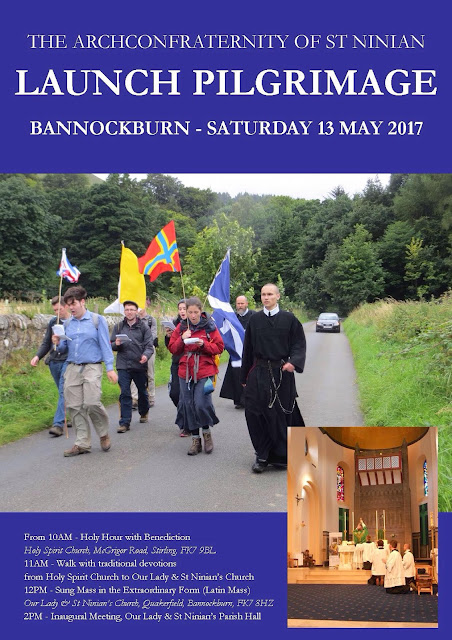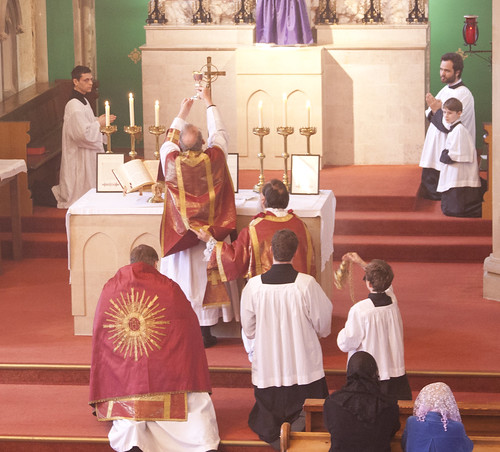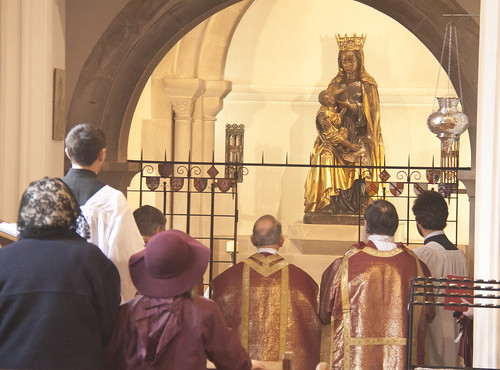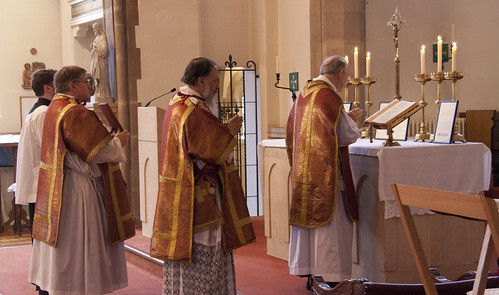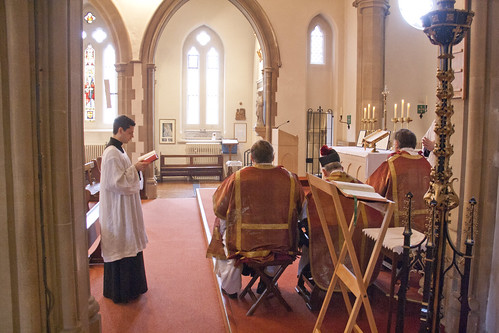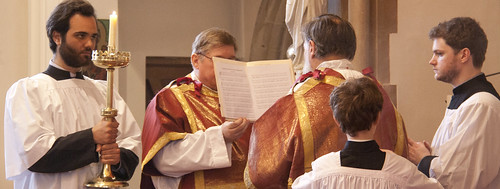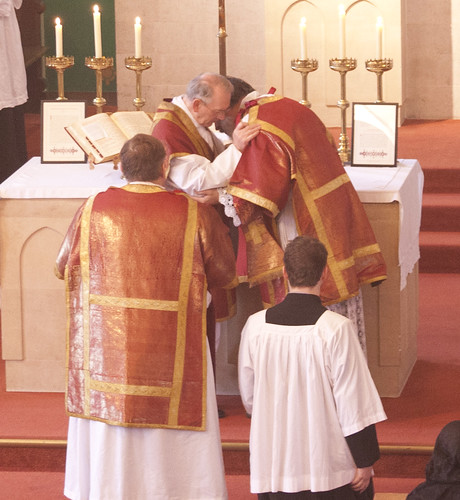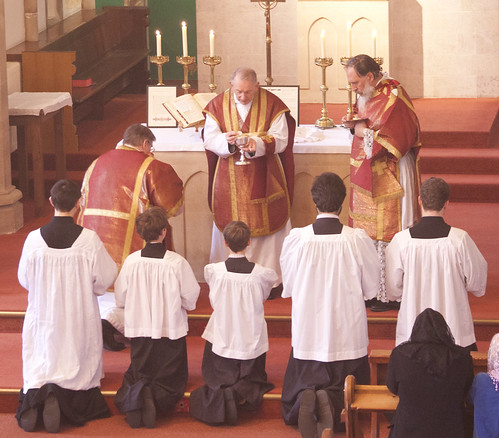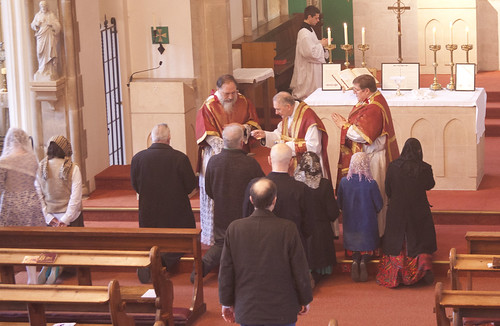Chairman's Blog
Silverstream Priory on RTE
A sympathetic introduction to the traditional Benedictines at Silverstream in Ireland.
Support the work of the LMS by becoming an 'Anniversary Supporter'.
The Challenge of Islam: Part 1 - the end of secularisation
I was reminded of this post from July 2014 by a story in The Tablet about retired Major-General Tim Cross, an Anglican, who was in despair about the attitude at the Foreign Office that religion really couldn't be the real explanation of anything important in, say, Iraq. The message is sinking in, but very slowly.
The other posts in the short series this post introduced are:
2. Religious Liberty
3. Caught in the Critique of the Decadent West
---------------------------------
I've been reading up a little on the sociology of religion, and the latest stuff is no longer about the Secularisation Thesis: the inevitable secularisation of society. This was to do with the ideas of the Enlightenment, wider education, and prosperity, eroding religious belief, as expressed in that stupid poem by the over-rated Matthew Arnold, published in 1867.
The Sea of Faith
Woodhead explains how sociologists' faith in the secularisation hypothesis was shaken first by the Salman Rushdie affair. Rushdie's book The Satanic Verses was condemned by the Ayatollah Khomeini, who issued a 'fatwa' (ruling) against Rushdie, ordering that he be killed. This was in 1989. It made the sociologists realise that religion, or at least Islam, was actually stronger, in its ability to shape events, even in the West, than it had been before: it wasn't fading away in obedience to the Secularisation Thesis. And then, 22 years later, there was 9/11
If Western sociologists had been paying attention, they would have noticed the revival of Islamic practice and zeal with started in Egypt in the 1970s, and was continued by the Islamic Revolution in Iran in 1979, and has continued some more in the overthrow of a whole heap of secular-minded regimes across the Arab world in recent years. To give them due credit, however, sociologists like Woodhead have been more on the ball than Western politicians, who appear to have clung to the Secularisation Thesis right up to the last few months. I suspect many of have not abandoned it yet. The idea that all the Middle East needs is prosperity and education, and religious zealotry will dissipate, is still rattling around in the corridors of power. Do these people read the newspapers? Syria was a prosperous nation with a big, educated middle class. They've got money coming out of their ears in the Gulf. There are universities of international standard in Egypt. And guess what? It was as those universities that the Islamic revival began. It was there, not in the slums, where young women started to wear head scarves.
In truth, the Secularisation Thesis was kept on its shakey legs after the War not by the inevitable effects of education and prosperity, but by the Cold War. It was the resources poured into Communist and anti-Communist factions, by East and West, which made the world outside North America and Western Europe look as if it was focused on secular issues. Once that was out of the way, an awful lot of people have turned to traditional religious themes to assert their identity and culture and distinguish themselves from their colonial past. We are now living in a period in which radicalised Hindus are persecuting Muslims in India, radicalised Buddhists are persecuting Muslims in Burma and Sri Lanka, radicalised Sunni Muslims are persecuting Shia Muslims in Iraq, and Christians are being persecuted by pretty well everyone. It's not a pretty sight, but it's not secularisation.
Is victory for the homosexual lobby and 'reproductive rights' feminists at the United Nations around the corner? You've got to be joking. I follow the excellent Friday Fax, which covers the infinitely depressing machinations of the World Government in Waiting. The progressive lobby's breakthrough is always round the corner. They've got the western nations in their pockets, they have the procedures taped, they like to see aid money being used to buy votes. But things are not going their way. A horrible realisation should begin to dawn on them some time soon. We have a world-wide revival of traditional values on our hands.
To repeat, this has actually been going on at least since the early 1970s. And it is not just Islam. Even Christianity is benefitting: the Catholics of southern India and West Africa, pressure from Hindus and Muslims notwithstanding, have had a very good few decades, and the very visible presence of their priests in the West has more to do with the massive numbers of vocations they have than persecution. In China, too, Christianity is on the march, as the most vigorous alternative to Communism.
There is nothing inevitable about secularisation. The sociologists have now accepted this, and the politicians, eventually, will follow them. This reality will solve some problems, such as the prospect of a right to abortion being established in international law by some international mega-treaty, but obviously creates others. The punch-line of this blog post is simply this: in addressing the problems, which are very real and very pressing, let's not try to pretend that the Secularisation Thesis is true after all. And part of that pretence is the guff about Religious Freedom.
I've argued more than once that appeals to Religious Freedom, to defend the Church against militant secularists in the West, is a complete waste of time. It is even more of a waste of time when directed against non-Christian religious zealots. This is so blindingly obvious that it shouldn't need saying, but I am saying it because I can see the temptation to make this appeal in a recent speech by Lord (David) Alton. I'll address this in the next post.
Support the work of the LMS by becoming an 'Anniversary Supporter'.
2017 Launching a new Confraternity in Scotland: May 13
The event will take place in Bannockburn, Stirling, and the proposed format is as follows:
From 10am (TBC): Holy Hour concluding with Benediction of the Blessed Sacrament;
11am: Procession from Holy Spirit Church to Our Lady & St Ninian's Church with traditional devotions;
12 noon: Sung Mass;
2pm: Inaugural Meeting to formally establish the Archconfraternity.
13 May will be the 100th anniversary of Our Lady's 1st Apparition at Fatima so we will also incorporate the devotions necessary to obtain the plenary indulgence associated with the centenary.
Support the work of the LMS by becoming an 'Anniversary Supporter'.
The Government bans independent midwives: in the Catholic Herald
I've been trying (with some success) to get Catholic and pro-life news outlets to take an interest in the shocking story of the banning of 'independent' midwives in the UK: that is, midwives who are employed by individual women to assist them in giving birth, rather than the NHS or a private hospital or 'birth centre'. Independent midwives had a fantastic safety record, but the Government regulator, the Nursing and Midwifery Council, has told them their insurance is 'inadequate': just not what 'adequate' actually means.
Why is this a Catholic story? Because the culture of the NHS is far from pro-life, and independent midwives offer a client-focused alternative. In the NHS women routinely face pressure to have abortions, pressure to limit family size after Caesarian sections (which is related to pressure not to have a natural birth after a section), pressure to limit family size for any and no reason, pressure to stop having children after a certain arbitrary age (you can be 'high risk' at 35), and a patronising and totally out of place pep-talk on contraception, which is apparantly a legal obligation following childbirth. Independent midwives are not as a group committed to any special pro-life principles, but they have the freedom to care about their clients and genuinely respect their choices and values. If you are having a tough time with the NHS on any of these issues, they are a safe harbour. But no longer.
If you want to protest, see the website 'Save Our Midwives' for suggestions. The story has also appeared in Church Militant.
From the Catholic Herald.
In preparing for the birth of our first child, we considered all the available options. Our research was not reassuring. Expectant mothers could talk to midwives, but it may not be the one who would assist at the birth. There was a birthing pool, but it might not be available when the moment came. Yes you can give birth at home, if a midwife was free. When it comes down to it, the mother’s preferences and plans for birth might, or might not, have some application when labour starts
Our friends’ experiences of the NHS didn’t reassure us either, and it seems they were not untypical. A recent study reported women feeling unsafe and frightened while in NHS facilities, describing their experience as being treated “like cattle” or being “on a conveyor belt”.
See the rest there.
Support the work of the LMS by becoming an 'Anniversary Supporter'.
Shaming men into virtue: a text-book case from Matt Walsh
Matt Walsh writes:
How can we expect our children to be righteous, to be generous and disciplined and faithful and godly, if their own father has not provided a demonstration of those traits? How can we demand virtue in others that we can hardly locate within ourselves? How can a real man rely on his wife to carry this burden alone or primarily? We, as men, are called to be the spiritual light to our family. When we engage in weak, shameful, selfish and childish behaviour, we dim the light. After a while, the light goes out altogether and our family is left to stumble around in the darkness. This is one of the many reasons why we need to reject porn and other vices, all which serve to lessen us, emasculate us and extinguish the light.
Well it is true, of course, but is this really the best way to inspire men to take up their role, as Walsh puts it, of 'leadership'? And what kind of 'leadership' does this, in fact, suggest? So far, it is just one of example. An example of suffering. Sounds a bit like a doormat, doesn't it?
Fathers and husbands should be sources of wisdom. But wisdom is the final product. The ingredients are knowledge, experience, and faith. Many of us have almost completely neglected two of those components and are just hoping that one day wisdom will miraculously sprout out of our heads like a magical beanstalk. I don’t think it works that way.
'Many of us' is an interesting phrase. The reader is invited to identify himself in it, but it is also a generalisation about men in general. Men combine ignorance with arrogance. Hang on a mo! Are these the people Walsh thinks have a divine mandate to the role of leadership in their families? Does that make sense?
CS Lewis says that Heaven is an acquired taste. I think something similar could be said of fatherhood and family life. The average 18-year-old, especially in today’s culture, has no taste for it because he simply cannot conceive of what it means to find actual joy in serving and leading others. He seeks only superficial pleasure and cannot comprehend any other kind. This is how most of us live until we have families.
At one level this is demeaning to the minority of men who do not live hedonistically and irresponsibly before marriage. They do exist. I know quite a few. What are they supposed to think when they read this? Which they are far more likely to do than the other kind. But don't worry: they are used, from the mainstream Church, to the patronising assumption that they are, nudge nudge, all deep sinners and have characters shaped by this reality.
At another level, the tone Walsh has adopted is far more dangerous. It displays absolutely zero sympathy with or comprehension of the boys and young men who have fallen into the habits of the dominant culture of our time. They cannot comprehend the pleasures of family life? I confess this makes me angry. Walsh is talking about young men who have been deprived of family life in their own childhoods, who long for family life as adults, and who are prevented from establishing anything resembling traditional family life by economic and cultural conditions which they are powerless to change. Walsh's response is to blame them. Right, yes, those unemployed guys in the sink-estates, they are the ones who passed the Divorce Act in 1968, who destroyed blue-collar jobs in the 1970s, and taught women that to accept the authority of a husband is shameful. They did this somehow before they were even born. Yes, blame them, Matt, it seems to make you feel better. But it won't help them out of their problems, which are real problems, not just middle-class hang-ups you can snap out of.
So what has Walsh not said in this post?
He has said nothing about the nature or purpose of male leadership, or the (presumably, good) qualities of men which adapt them to take this role on. The suspicion of many readers, whether they articulate it this way or not, will be that he doesn't have a real conception of male leadership at all, but just thinks men ought to allow themselves to be exploited: this is, after all, the message of the majority culture. This is, of course, part of what has created the problem Walsh identifies with the hedonistic young men, because it makes family life unattractive.
Walsh sees at least the symptoms of the problem, and does his best to make it worse. Catholic apologists really should stop doing this.
See my post on The Economist on the 'man crisis', and the label 'Patriarchy'.
Support the work of the LMS by becoming an 'Anniversary Supporter'.
Pilgrimage to Caversham 2017: photos
Our Lady and St Anne, Caversham, houses the official Marian Shrine of the Archdiocese of Birmingham, crowned by Papal mandate: the shrine image is below.
It was the Ember Saturday of Lent, and we had five 'prophecies', Old Testament readings, before the Epistle and Gospel, rather like the Easter Vigil.
Support the work of the LMS by becoming an 'Anniversary Supporter'.
Me on Newsnight: last night
Last night I was, briefly, a talking head on Newsnight, talking about Pope Francis. The main problem was to get the presenter - and, I suppose, the audience - to have the smallest understanding of the concept of Catholic doctrine, what the Pope's function is, and what schism means. That didn't really leave much time for anything else.
In the UK you can see the whole programme online here, from 18:30 - 22:16 mins:
http://www.bbc.co.uk/.../episode/b08hwb7d/newsnight-10032017
They've put a little clip on Twitter:
https://t.co/2FcLa0m5fN
Maybe someone can let me know if the whole thing goes up on YouTube.
Support the work of the LMS by becoming an 'Anniversary Supporter'.
The empty Imperial throne
Over on Rorate Caeli I've posted an article by James Bogle, former FIUV President, LMS Committee member and author of a book on Bl Charles of Austria, on the role formerly played by the Holy Roman Emperors (and indeed by the Christian emperors of Rome) in Church affairs, and the consequences of the disappearance of the Emperor from Europe's life.
It is easy to point to periods of conflict between Pope and Emperor. Conflict is inevitable over time and itsn't always unhealthy. What is worse than the conflict between the two pillars of Christian society, the spiritual and the temporal, is the disappearance for practical purposes of one side of the conflict: the disappearance of lay leadership in the Church. This is a point discussed in the FIUV Position Paper on the Extraordinary Form and the Laity.
It is not that the Pope since 1918 has made himself the Emperor; it is that the Catholic Emperor's power has been taken by people outside the Church.
I was very struck recently reading Valentin Tomberg's discussion of the symbolic meaning of the figure of the Emperor. He wrote, in part:
Europe is haunted by the shadow of the Emperor. One senses his absence just as vividly as in former times one sensed his presence. Because the emptiness of the wound speaks, that which we miss knows how to make us sense it.
Support the work of the LMS by becoming an 'Anniversary Supporter'.
Pray for the Pope
Alwys a good idea, never more so than now. From my 'Chairman's Message' in the latest Mass of Ages, the quarterly magazine of the Latin Mass Society.
--------------------
Support the work of the LMS by becoming an 'Anniversary Supporter'.
Declaration on Sacred Music
-------------------------------------------------------------------
In honor of the 50th anniversary of the Instruction Musicam Sacram (promulgated March 5, 1967), a Declaration on Sacred Music Cantate Domino, signed by over 200 musicians, pastors, and scholars from around the world, is published today in six languages (English, Italian, Spanish, Portuguese, French, and German). This declaration argues for the continued relevance and importance of traditional sacred music, critiques the numerous serious deviations from it that have plagued the Catholic Church for the past half-century, and makes practical suggestions for improving the situation.
“CANTATE DOMINO CANTICUM NOVUM”
A Statement on the Current Situation of Sacred Music
The musical tradition of the universal Church is a treasure of inestimable value, greater even than that of any other art. The main reason for this pre-eminence is that, as sacred song united to the words, it forms a necessary or integral part of the solemn liturgy. Holy Scripture, indeed, has bestowed praise upon sacred song, and the same may be said of the fathers of the Church and of the Roman pontiffs who in recent times, led by St. Pius X, have explained more precisely the ministerial function supplied by sacred music in the service of the Lord. Therefore sacred music is to be considered the more holy in proportion as it is more closely connected with the liturgical action, whether it adds delight to prayer, fosters unity of minds, or confers greater solemnity upon the sacred rites. But the Church approves of all forms of true art having the needed qualities, and admits them into divine worship. (SC 112)
On these grounds Gregorian Chant has always been regarded as the supreme model for sacred music, so that it is fully legitimate to lay down the following rule: the more closely a composition for church approaches in its movement, inspiration and savor the Gregorian form, the more sacred and liturgical it becomes; and the more out of harmony it is with that supreme model, the less worthy it is of the temple. (St. Pius X, Motu Proprio Tra le Sollecitudini)
As a response to a word which preceded it, Abraham’s faith would always be an act of remembrance. Yet this remembrance is not fixed on past events but, as the memory of a promise, it becomes capable of opening up the future, shedding light on the path to be taken. We see how faith, as remembrance of the future, memoria futuri, is thus closely bound up with hope. (LF 9)
Signed (partial list)
Mº Aurelio Porfiri
Honorary Master and Organist for the Church of Santa Maria dell’Orto, Rome
Publisher of Choralife and Chorabooks, Editor of Altare Dei
Peter A. Kwasniewski, Ph.D.
Professor & Choirmaster
Wyoming Catholic College, WY, USA
Most Rev. Athanasius Schneider
Auxiliary Bishop of Astana
President of the Liturgical Commission of the Conference of the Catholic Bishops of Kazakhstan
The Most Reverend Rene Henry Gracida, D.D.
Bishop Emeritus of Corpus Christi
Abbot Philip Anderson
Our Lady of Clear Creek Abbey
Hulbert, Oklahoma, USA
Rev. Prof. Nicola Bux
Priest, Archdiocese of Bari
Professor of Eastern Liturgy and Sacramental Theology
Sir James MacMillan C.B.E.
Composer and conductor
Peter Phillips
Founder and Director of the Tallis Scholars
Publisher of the Musical Times
Bodley Fellow, Merton College, Oxford
Chevalier de l’Ordre des Arts et des Lettres
Colin Mawby, K.S.G.
Liturgical Composer and Master of Music at Westminster Cathedral 1961–1977
Kevin Allen
Composer
Chicago, IL, USA
Frank J. La Rocca, Ph.D.
Composer
Emeritus Professor of Music, Oakland, California, USA
M° Giorgio Carnini
Organista, compositore e direttore d’orchestra
Presidente Associazione Camerata Italica
Direttore artistico del festival e progetto “Un organo per Roma”
Buenos Aires; Roma
Prof. Giancarlo Rostirolla
Musicologo, Ricercatore, Accademico
Presidente dell’Istituto di Bibliografia Musicale
Direttore Artistico della Fondazione Giovanni Pierluigi da Palestrina
William Peter Mahrt, Ph.D.
Associate Professor of Music, Stanford University, Stanford, California
President, Church Music Association of America
Professor, Department of Theology
University of Notre Dame
Dr. Joseph Shaw
Senior Research Fellow, St Benet’s Hall, Oxford University
President of the Latin Mass Society of England & Wales
Martin Mosebach
German novelist & essayist
Frankfurt am Main, Germany
Roberto Spataro
Docente ordinario Università Pontificia Salesiana
Segretario della Pontificia Academia Latinitatis
Dottor Ettore Gotti Tedeschi
Economista e banchiere
Prof. Dr. Massimo de Leonardis
Ordinario di Storia delle relazioni internazionali
Direttore del Dipartimento di Scienze Politiche
Università Cattolica del Sacro Cuore
Milano – Italia
Rev. George William Rutler, M. St. (Oxon.), S.T.D., LL.D.
Pastor, Church of Saint Michael
New York City, New York
Rev. Brian W. Harrison, OS, MA, STD
Associate Professor of Theology (retired), Pontifical Catholic University of Puerto Rico
Chaplain, St. Mary of Victories Chapel,
St. Louis, Missouri, USA
Rev. Thomas M. Kocik
Parish Priest, Fall River, Mass., USA
Past Editor, Antiphon: A Journal for Liturgical Renewal
Rev. Richard G. Cipolla
Pastor, St. Mary’s Church
Norwalk, CT
Rev. James V. Schall, S.J.
Professor Emeritus
Georgetown University
Washington, DC, USA
Prof. Pier Paolo Donati
Direttore di “Informazione Organistica”
Già docente di Storia della Musica all’Università di Firenze
Rev. John Zuhlsdorf
Madison, WI, USA
Vytautas Miskinis
Composer, Conductor, Professor
Artistic Director of Boy’s and Male Choir AZUOLIUKAS
Professor of Lithuanian Academy of Music and Theatre
President of Lithuanian Choral Union
Wilko Brouwers
Utrecht Center for the Arts
Gregorian Circle Utrecht
Scott Turkington
Director of Sacred Music
Holy Family Church & Holy Family Academy
Minneapolis, Minnesota, USA
Jeffrey Morse
Schola Gregoriana of Cambridge
Rev. J. W. Hunwicke
Priest of the Ordinariate of Our Lady of Walsingham
sometime Head of Theology, Lancing College
formerly Senior Research Fellow, Pusey House, Oxford
Right Reverend Archimandrite John A. Mangels
St. Augustine Antiochian Orthodox Christian Church, Denver CO, USA
Founder of the Ambrosian Choristers
Founder & President
Christopher Mueller Foundation for Polyphony & Chant
Massimo Lapponi O.S.B.
Monaco sacerdote professo dell’Abbazia Benedettina di Farfa
già docente di Etica e Filosofia della Religione presso il Pont. Ateneo di Sant’Anselmo
Patrick Banken
President of Una Voce France
Vice President of the International Federation Una Voce
Support the work of the LMS by becoming an 'Anniversary Supporter'.

